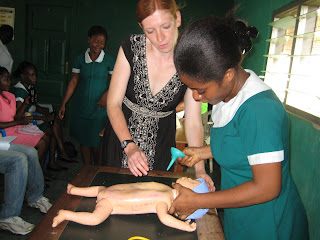| The Health Team and MVP staff in Manso-Nkwanta |
The Health
Team recently visited the Millenium Village Project, specifically the
communities of Groso, and Manukrom in the Bonsasso Millennium village
cluster. Click here to read about UN Millennium Village project there and here for their blog.
Since 2007, GHEI and MVP have been sharing ideas. This makes sense since GHEI and MVP share a similar philosophical ground, that is, a direct investment in empowering community members will bring communities out of poverty. In 2007, GHEI staff visited the millennium village, and in 2009, more formal sharing took place, specifically about health programs. Then in 2010, MVP staff visited GHEI in Humjibre. MVP staff visited to learn more about GHEI’s malaria program, particularly how GHEI encourages bednet usage. Thanks to this meeting, MVP implemented bednet distributions based on some of GHEI’s methods in three pilot villages.
Since 2007, GHEI and MVP have been sharing ideas. This makes sense since GHEI and MVP share a similar philosophical ground, that is, a direct investment in empowering community members will bring communities out of poverty. In 2007, GHEI staff visited the millennium village, and in 2009, more formal sharing took place, specifically about health programs. Then in 2010, MVP staff visited GHEI in Humjibre. MVP staff visited to learn more about GHEI’s malaria program, particularly how GHEI encourages bednet usage. Thanks to this meeting, MVP implemented bednet distributions based on some of GHEI’s methods in three pilot villages.















